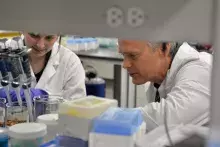
Researchers at Kwantlen Polytechnic University (KPU) are helping combat disease found on dairy farms using technology developed at the university’s Applied Genomics Centre.
Mycoplasma bovis is a bacterium known to cause a range of serious illness in cattle, including mastitis, pneumonia and arthritis. Using genetics tools, KPU researchers have developed a test allowing for early detection of a bacterial infection to help farmers better understand its impact and ultimately improve the health of dairy cows.
“Dairy is a large industry in Western Canada, and one of the big threats to dairy is animals getting sick,” says Dr. Paul Adams, director of the Applied Genomics Centre and a faculty member in the biology department at KPU. “We are helping the industry to detect some of the bacteria that are causing illness in the dairy cows. We are using genetics tools to do this, and we’ve come up with some new ways to do this more cost-effectively, to make it very economical for the farmers.”
Using the same polymerase chain reaction (PCR) technology as COVID-19 testing, the KPU test proved to be highly accurate in trials. Now KPU researchers are testing milk across Western Canada.
“Farms from here to Manitoba are sending us samples from their bulk tank,” says Adams. “The purpose of that is for us to understand how common is this bacterium in Western Canada.”
Highlighting the need for reliable testing is action taken by New Zealand, whose goal of eradicating Mycoplasma bovis includes a ban of untested Canadian dairy imports, notes Adams. Officials there have found the bacteria does not present a food safety risk but does have a negative impact on animal welfare and production, and tens of thousands of animals have been culled as part of the eradication program.
No such eradication program exists in North America. But farmers here want to better understand the situation and the role Mycoplasma bovis has in causing animals to be sick.
“We want to understand it better. Is it causative or is it opportunistic? Those are two very important things to distinguish. Clearly New Zealand has taken the stance it’s causative. They’re investing incredible amounts of money and resources,” says Adams.
Part of KPU’s work involves an epidemiology study, results of which Adams hopes will be ready by spring.
“This is a lot about understanding it better, and sharing the information with the community so they can be better informed on decision-making for themselves.”
Chris Parry, chief executive officer of the WestGen Group of companies, which has partnered with KPU on the research project, says the industry in Western Canada is still learning about the bacterium’s impact.
“We know it is a growing issue in Canada,” says Parry. “Through our partnership with KPU we aim to find solutions for our producers to make informed decisions in the identification and management of the problem.”
Founded in 2019, the Applied Genomics Centre at KPU’s Surrey campus is a research lab focused on developing molecular genetic and cellular product solutions for the agricultural and human health sectors. Its research includes course-based student-led projects and large industry partner projects.